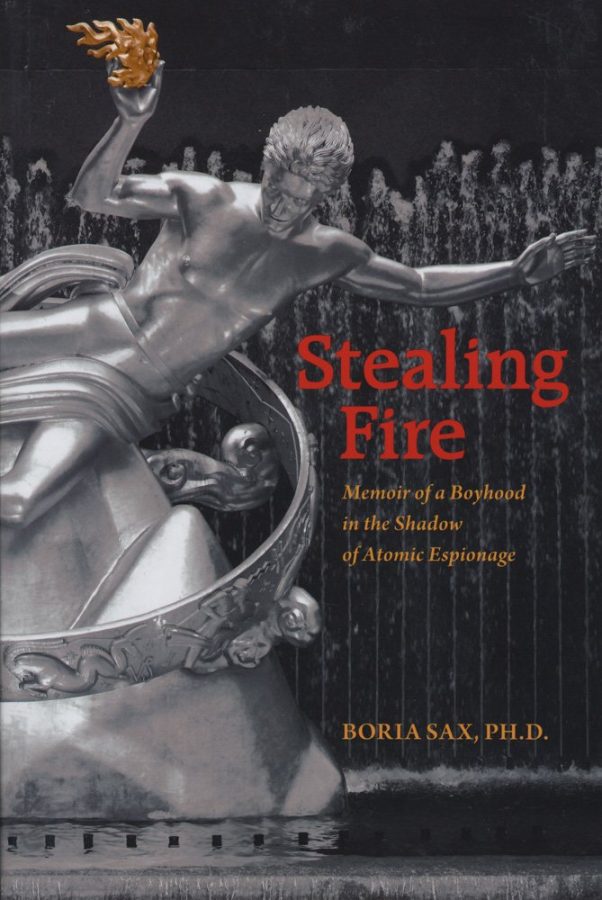Author of ‘Stealing Fire’ Discusses Father’s Atomic Espionage
Author and Mercy College professor, Boria Sax, hosted a panel at the Dobbs Ferry campus on Oct. 28 to discuss his book, which recounted his traumatic childhood of his father being accused of being a spy and selling atomic secrets to the Soviet Union.
Sax, who is a senior lecturer for Mercy’s English department, sat down in front of a small audience of both virtual and in-person guests to discuss his 2014 memoir Stealing Fire: Memoir of a Boyhood in the Shadow of Atomic Espionage.
In the book, Sax wrote about his father Saville Sax, and how his involvement in the world of espionage plagued his family and led to devastating effects.
Effects Sax still remembers well. And he also believes that the era of history has created a situation a large number of people can relate to.
“It’s a period and phenomenon that has slipped through our collective memory,” Sax said. “I think so many people have a mysterious uncle or something of the sort. There’s a lot that is repressed…even when the source of these things is fading from memory. And that’s part of the reason why I wanted to write down my experience.”
Even though there were whispers about his father’s true life during his childhood, Sax did not know Saville Sax’s mission to steal the secrets of the Manhattan Project and give them to the Soviet Union in the 1940s.
And when in his adult life did discover his father’s secrets, Sax saw everything in a new light.
“I had a very tempestuous relationship with him, to begin with. At first, I felt mad and upset, but gradually it enabled me to make sense of things in my childhood that had previously seemed completely out of comprehension.”
Sax’s childhood home was a boiling pot of tension, fear, paranoia, and uncertainty.
Yet this memoir isn’t only an analysis of Sax’s father and the personal fallout caused by espionage, it is also a deconstruction of this era in American history.
“I want to bring some of these things that we have blocked from our minds before it becomes too late. Before it completely vanishes from our collective memory,”
Sax then discussed the concept that the societal trauma endured during that time period has either become romanticized in film or completely forgotten and discarded.
Sax recalled times during elementary school when he and his classmates practiced safety drills in case of a nuclear attack.
These situations have become a lost topic in mainstream conversations.
“So much has been repressed and ignored…it was terrifying and can hardly be anything else but terrifying.”
The idea that this has become a repressed history connects to why not a lot of eyes are on Stealing Fire. Sax went on to say that even though he has hosted numerous events where he talks to a full audience, Stealing Fire does not get the same treatment.
“I have published a lot of books, and this is the one that has gotten the least notice. I think that there are things in that period that people aren’t ready to face up to yet.”
When talking about the title of his memoir, Sax reveals he took inspiration from the story of Prometheus from Greek mythology, who stole the fire of the Gods to give to humanity and applied the tale to his father’s career as an atomic spy.
Sax said that many see men like Oppenheimer and the creation of nuclear weapons as Promethean in nature. However, “it seemed to me the real men acting as a Prometheus were the spies. The ones who stole the secrets. For better or worse, the myth is much more a description of the spies than it is of the leading scientists.”
Before writing his powerful memoir, Sax still felt some anger towards Saville Sax, who died in September of 1980. But now, Sax looks at his father through a more sympathetic lens.
“Over the years, the anger I felt has faded. I see the whole event and the whole period in far less moralistic terms than I used to. I see him as a tragic figure, a part of a larger tragedy. A tragedy of the times.”

Maleek Munroe is a senior at Mercy College, majoring in communications. He graduated Nyack High School, where he found his love and passion for both...








